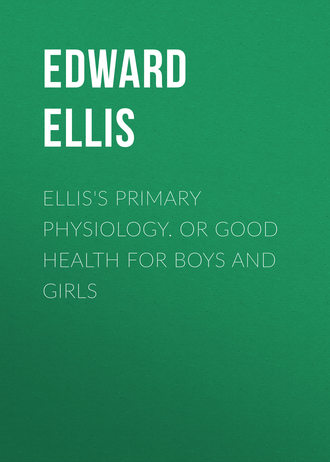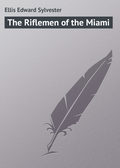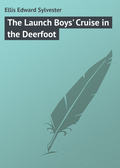
Ellis Edward Sylvester
Ellis's Primary Physiology. Or Good Health for Boys and Girls
CHAPTER X
ANOTHER METHOD OF TREATMENT IN CASES OF ASPHYXIA FROM DROWNING, CHLOROFORM, COAL-GAS, ETC
The following method is recommended by Marshall Hall, a very high authority on all such questions:
“Treat the patient instantly on the spot, in the open air, freely exposing the face, neck, and chest to the breeze except in very cold weather.
“In order to clear the throat, place the patient gently on the face, with one wrist under the forehead, that all fluid, and the tongue itself, may fall forward, and leave the entrance into the windpipe free.
“To excite respiration, turn the patient slightly on his side, and apply some irritating or stimulating agent to the nostrils, such as hartshorn.
“Make the face warm by brisk friction: then dash cold water upon it.
“If not successful, lose no time; but, to imitate respiration, place the patient on his face, and turn the body gently, but completely on the side, and a little beyond; then again on the face, and so on, alternately.
“Repeat these movements deliberately and perseveringly, fifteen times only in a minute. (When the patient lies on the thorax, this cavity is compressed by the weight of the body, and expiration takes place. When he is turned on the side, this pressure is removed, and inspiration occurs.)
“When the prone position is resumed, make a uniform and efficient pressure along the spine, removing the pressure immediately, before rotation on the side. (The pressure augments the expiration; the rotation commences inspiration.) Continue these measures.
“Rub the limbs upward, with firm pressure and with energy. (The object being the return of venous blood to the heart.)
“Substitute for the patient's wet clothing, if possible, such other clothing as can be instantly procured, each by-stander supplying a coat or cloak, etc. Meantime, and from time to time, to excite inspiration, let the surface of the body be slapped briskly with the hand.
“Rub the body briskly till it is dry and warm, then dash cold water upon it, and repeat the rubbing.
“Avoid the immediate removal of the patient, as it involves a dangerous loss of time; also, the use of bellows, or any forcing instrument; also, the warm bath and all rough treatment.”
Describe the first step recommended by Marshall Hall in the case of asphyxia from drowning, chloroform, coal-gas, etc.
How would you clear the throat?
How is respiration or breathing excited?
What should be done to the face?
If not successful in reviving the patient, what should be done to excite respiration?
How often should this movement be repeated?
Explain how respiration is produced by this proceeding.
What is the next step? Explain its meaning.
What should be done with the limbs? What is the object?
What of the patient's wet clothing? What should be done from time to time?
What else is recommended to be done?
What should be avoided?
Now, give every step to be taken in resuscitating persons by Hall's method.
CHAPTER XI
THE MUSCLES
You are provided by nature with about four hundred muscles. Every one has its special use. They are fastened to the bones, which can only be moved by them. The principal muscles are shown in the figure on page 45.
The muscles are generally found in pairs, so that when motion is produced in one direction, another muscle or group of muscles causes motion in the opposite direction.
VOLUNTARY AND INVOLUNTARY MUSCLES
A voluntary muscle is one which you can control; an involuntary muscle is not subject to your will. Thus, when you move your hand or foot, it is done by a voluntary muscle. Your heart beats without any will of your own, and is therefore, controlled by involuntary muscles.
STRENGTH OF MUSCLES
A well-developed man can drag a little less than his own weight over a level surface, while a draught-horse can draw only two-thirds. The horse, therefore, is relatively weaker than man. There are some insects, however, which are able to move nearly fifty times their own weight.
From what you have learned about the importance of exercise, you will understand how necessary it is that every muscle should be trained. In no other way can you preserve sound, rugged health.
HYGIENE OF THE MUSCLES
When the muscles are properly used, they become large, firm, and dark red in color. Such use of them causes the skin to act freely, while the brain is made vigorous and the digestion improved. It is the best medicine in the world. You must be careful not to strain or overwork your muscles, as it is very hurtful. Your strength must be built up by moderate, careful, and regular exercise.
The muscles need not only exercise to make them strong, but a constant supply of good, pure blood. You must eat wholesome food, in proper quantities, at regular intervals.
You must take plenty of exercise in the sunlight. The blood and the muscles demand the light and the heat of the sun to make them strong.
EFFECTS OF EXERCISE
The effect of exercise upon the muscles may be clearly seen in the arm of the blacksmith; in the foot and leg of the walker; in the fingers of the pianist; and in the hand and fore-arm of the skillful penman.
How many muscles have you? How are the bones moved?
How are the muscles generally found? In what manner do they work?
What is a voluntary muscle? An involuntary one? Illustrate the difference.
Compare the strength of a well-developed man with that of a horse. What is said of some insects?
Why should the muscles he trained? What is the result?
What kind of medicine is such exercise? How must your strength be built up?
What do the muscles need beside exercise?
Where should the exercise be taken?
Show some of the effects.
CHAPTER XII
REST AND POSTURE
“Early to bed and early to rise” should be your motto. Children need abundant sleep, and ought to retire early and rise as soon as they awake in the morning. Their bodies and brains require regular rest.
Never lie on your back when sleeping, but on the left or right side. Place your limbs in the easiest position possible; otherwise you will be troubled by bad dreams, which will awake you from slumber. Try to keep your mouth closed, so as to breathe through your nostrils. You will thus escape the unpleasant habit of snoring.
TIME FOR SLEEP
Infants and old people need more sleep than boys and girls. Night is made for rest, and the day for work. Do not take naps through the day nor sit up late at night. Never lie down to sleep directly after a meal.
POSITION IN STANDING, ETC
Children are apt to stand and sit in a wrong position. When walking, the head and shoulders should be thrown back, so as to give the lungs full play. Breathe slowly and deeply, filling every part of the lungs at each inspiration. When in the school-room or at home, be careful not to lean over by bending the body in the middle of the back.
I am afraid that a good many children will find, if they notice their posture when studying their lessons, that their spines are curved like a bow and their shoulders pushed forward so as to crowd the lungs and prevent deep, healthful breathing. The boys, perhaps, will find a large dent or wrinkle in their clothing in front at the pit of the stomach. This shows that their posture is wrong.
WHERE TO BEND THE BODY
If you wish to bend forward, the pivot is at the hips; the spine should not be bent at all. When a child is reminded that his posture is wrong, he is apt to straighten up with a jerk, throw his shoulders far back and thrust his chest forward like a pouter pigeon. This is almost as bad as the other extreme, for it is unnatural, and after a few minutes, they gradually return to their former stoop. The natural posture is easy and graceful and can be held longer than any other.
What should be your motto? What do children need? What do their bodies and brains require?
What position should be taken when lying in bed? What should be done with the limbs? What of bad dreams? How can you avoid the habit of snoring?
Who needs the most sleep? What is said of night and day? What of taking naps through the day? When should you avoid sleep?
What of standing and sitting? What ought your posture to be when walking? What is the right way to breathe? What must be guarded against when in the school-room or at home?
What will a good many children find, if they notice their posture when studying their lessons? What will show a boy that his position is wrong?
What is the right way to bend forward? What of the spine? What is a child apt to do when shown that his position at the desk is wrong? What have you to say of this?
CHAPTER XIII
PURE AIR, CLOTHING, ETC
There can be no good health without pure air. Always have it if possible. Before you lie down to sleep at night, make sure your windows are lowered at the top and slightly raised at the bottom, so that the room is well ventilated. If the bed has enough covering, you will sleep much better if the air is fresh and cool.
It is a good practice to spend a few minutes early in the morning, in drawing into the lungs all the air they can possibly hold. Then breathe out slowly, by keeping the lips almost closed. While doing so, rapidly thump the chest and ribs with the flat sides of your fists. This will expand your lungs and prevent the congestion or settling of blood among many of the organs, besides strengthening and toning up the system.
PROPER USE OF CLOTHING
Your parents furnish you with warm, comfortable clothing, but much depends on you whether it shall help preserve your health. Children often catch cold and more serious diseases by carelessness about their dress. Be careful that all your garments sit well and are not loose enough to annoy you, nor tight enough to cause discomfort.
Boys should lay off their overcoats and overshoes, girls their wraps and overshoes when they enter a warm room. Always put them on before going out in the cold or wet. Neglect in following this rule has often caused pneumonia and death.
DAMP CLOTHING
If the clothing, shoes or stockings become wet, they should be changed at the earliest moment. If there is no chance to make such change, keep in motion until the garments can be replaced by others. If the moisture has reached the skin, it should be rubbed with a rough towel until dry and warm.
DANGERS TO HEALTH
Before summer sets in, children are often tempted to sit or lie on the damp earth. This is hurtful and never should be done, even in warm weather.
When heated from exercise, boys love to throw aside their outer clothing, so as to “cool off.” This is dangerous; better to feel uncomfortable for a little while until your body resumes its natural temperature.
COLD OR DRAFT
Never sit in a cold room or a draft. It is sure to injure you and may cause death. If you feel chilly, warm yourself by vigorous exercise.
Always obey the promptings of nature. Failure to do so poisons the blood, causes serious disease, and frequently destroys life itself.
Show the necessity of pure air. What precaution should be taken before lying down to sleep? What of drafts? What are necessary to sleep well?
What is a good practice for each morning? What will this do?
What depends upon you? What results from carelessness in these respects? Of what ought you to be careful?
What use should be made of overcoats, wraps, and overshoes? What has resulted from neglect to follow this rule?
What is the proper course, when the clothing, shoes or stockings become wet?
What are children often tempted to do in the spring of the year? Is it a safe thing to do at any time?
What is said about “cooling off?”
What about sitting in a cold room or draft?
What other advice is given?







